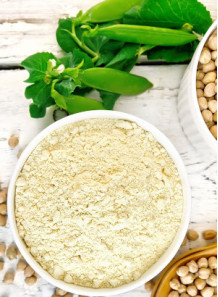Pea Protein Peptide
derived from the enzymatic hydrolysis of pea protein, which is a plant-based protein source obtained from the yellow pea (Pisum sativum)
Cart
No products
No products

derived from the enzymatic hydrolysis of pea protein, which is a plant-based protein source obtained from the yellow pea (Pisum sativum)
Pea protein peptides are derived from the enzymatic hydrolysis of pea protein, which is a plant-based protein source obtained from the yellow pea (Pisum sativum). These peptides have been studied for their potential health benefits, and research has revealed several advantages:
Antioxidant properties: Pea protein peptides have been found to possess antioxidant activities, which can help neutralize harmful free radicals in the body and protect against oxidative stress-related diseases, such as cardiovascular disorders, cancer, and neurodegenerative conditions.
Antihypertensive effects: Certain pea protein peptides have been reported to exhibit angiotensin-converting enzyme (ACE) inhibitory activity, which can help regulate blood pressure levels. ACE inhibitors are commonly used in the treatment of hypertension.
Antimicrobial activities: Some pea protein peptides have demonstrated antimicrobial properties against various bacterial strains, including foodborne pathogens like Listeria monocytogenes and Staphylococcus aureus. This property could potentially be utilized in food preservation and pharmaceutical applications.
Glucose metabolism regulation: Studies have suggested that pea protein peptides may have a beneficial effect on glucose metabolism by improving insulin sensitivity and glucose uptake by cells. This could be advantageous for individuals with diabetes or at risk of developing the condition.
Satiety and weight management: Pea protein peptides have been associated with increased feelings of satiety (fullness) and may potentially aid in weight management by promoting a sense of fullness and reducing caloric intake.
Digestibility and bioavailability: Compared to intact pea proteins, pea protein peptides are generally more easily absorbed and bioavailable, as they are smaller in size and require less digestion by the body's enzymes.
| Mechanism | - |
| Appearance | - |
| Longevity | - |
| Strength | - |
| Storage | - |
| Shelf Life | - |
| Allergen(s) | - |
| Dosage (Range) | - |
| Recommended Dosage | - |
| Dosage (Per Day) | - |
| Recommended Dosage (Per Day) | - |
| Mix Method | - |
| Heat Resistance | - |
| Stable in pH range | - |
| Solubility | - |
| Product Types | - |
| INCI | - |